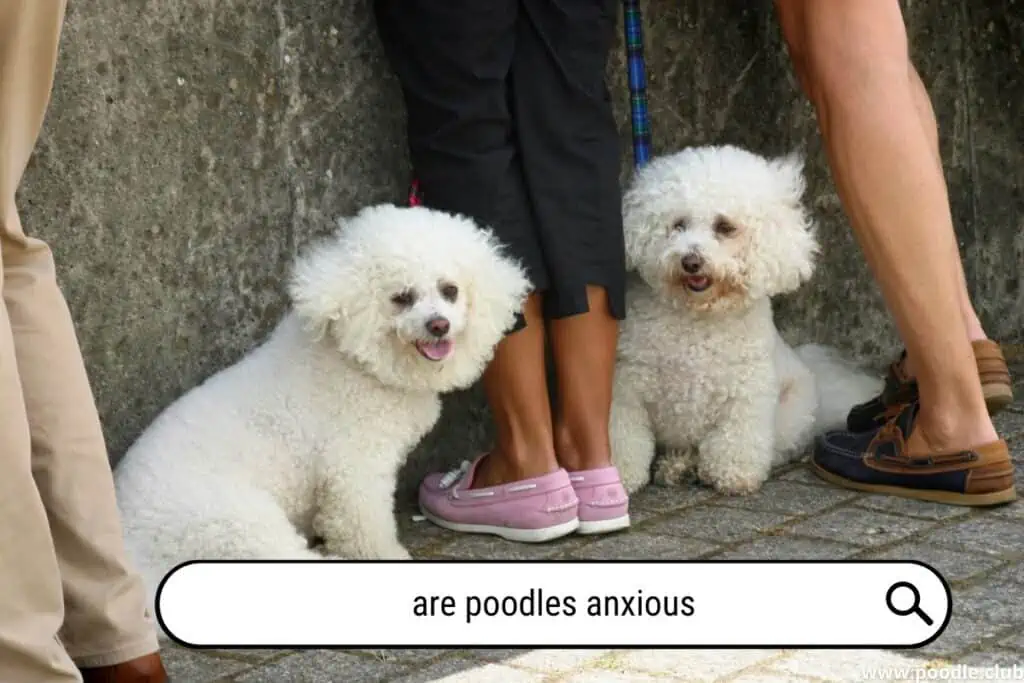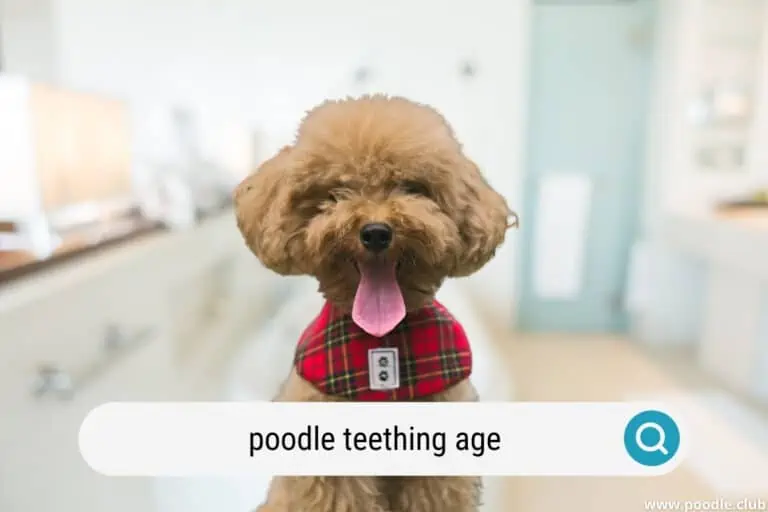Are Poodles Anxious? [7 Causes]
Recognized for their trademark curls and endearing personalities, Poodles are celebrated as friendly and smart companions. Yet, potential owners often ponder whether these chic canines are prone to anxiety.

Understanding a breed’s temperament significantly influences the bond and overall rapport between a pet and its owner. Hence, this is a question worth delving into.
Studies suggest that certain dog breeds, including Poodles and Collies, tend to exhibit signs of anxiety-related issues more frequently.
Anxiety in dogs may present in various forms, such as fearfulness, noise reactivity, and sometimes aggression. While this doesn’t imply that every Poodle is destined to be an anxious pet, it’s crucial to acknowledge this potential predisposition.
Bear in mind that even within the same breed, individual dogs can display vast temperament differences. Factors like genetics, environment, and upbringing play integral roles in determining a dog’s anxiety levels. By exploring Poodle anxiety more closely, we can enhance our comprehension of this breed, facilitating healthier, more joyful relationships with these curly pals.
Understanding Poodle Anxiety
Causes of Anxiety
Poodles, like all dog breeds, can experience anxiety. They may be vulnerable to stress and fear due to their high intelligence and sensitive nature. Some common causes of anxiety in poodles include loud noises, separation from their owners, and unfamiliar environments.
Anxiety in poodles may have a genetic component as well. Throughout the history of the breed, poodles have been bred for various purposes such as hunting, retrieving, and performing in circuses.
PuppySpot is a reputable dog marketplace where you can browse and find compatible puppies right from the comfort of your home. They have placed over 200,000 puppies into homes in the US!
This has led to the development of different sizes and temperaments, from the athletic and outgoing standard poodle to the more reserved miniature and toy poodles. Nonetheless, each poodle’s personality is unique, and individual experiences play a significant role in determining their anxiety levels.
Signs and Symptoms
Recognizing the signs of anxiety in your poodle is essential for their well-being. Poodles may exhibit a variety of physical and behavioral symptoms when they are feeling stressed or fearful (source). Some common physical signs include panting, drooling, and restlessness. In more severe cases, destructive behavior and aggression may occur.
Poodles may also show their anxiety through subtle body language cues. For example, a poodle might cower or tuck its tail between its legs when feeling frightened. In contrast, an excited or nervous poodle may exhibit excessive jumping or pacing.
It’s important to note that each poodle is different, and what might be a sign of anxiety in one individual might not be the same for another. Always pay close attention to your poodle’s unique body language and behavior to understand their emotional state.
Understanding and addressing poodle anxiety can greatly improve your furry friend’s quality of life. Keep in mind that anxiety varies among individual poodles and can be influenced by genetics, environment, and experiences. By familiarizing yourself with the potential causes and symptoms of anxiety, you’ll be better equipped to help your poodle navigate their world with confidence and ease.
Managing Poodle Anxiety
Training and Socialization
Poodles are intelligent and sensitive dogs, which can make them prone to anxiety if not properly trained and socialized. Beginning training and socialization early in a Poodle’s life is essential to building their confidence and setting them up for success. Introduce your Poodle to a variety of environments, humans, and other animals to help them feel comfortable and well-adjusted. For example, take them to the park to meet other friendly dogs and children. Keep in mind that consistent, positive reinforcement during training is crucial. A professional dog trainer can also provide guidance and support in cases of more challenging behavior issues.
Environmental Factors
A Poodle’s environment plays a significant role in their overall emotional well-being. Ensuring a calm and relaxed atmosphere at home can help alleviate anxiety. Remove any triggers that could cause stress, such as loud noises or crowded spaces.
Provide your poodle with a safe and comfortable space of their own, like a dog bed or crate, which can be their “safe zone” during moments of anxiety. Additionally, bear in mind that Poodles are sensitive to changes in routine and might get anxious in unfamiliar environments.
Try to maintain a consistent schedule and introduce changes gradually.
Exercise and Mental Stimulation
Keeping your Poodle healthy and happy is closely connected to their exercise and mental stimulation. These dogs are energetic and active, so it’s important to provide them with daily exercise, such as walks, running, or playtime at the park. Regular exercise will help keep their energy levels balanced and prevent signs of anxiety, such as pacing, destructive behavior, or excessive barking.
Mental stimulation is also vital to combat boredom, which can exacerbate anxiety in intelligent breeds like the Poodle. Provide toys and puzzles that challenge your Poodle’s problem-solving skills and encourage mental engagement. Offering obedience training or even enrolling your Poodle in canine sports like agility can provide both physical and mental outlets for their energy.
In conclusion, managing a Poodle’s anxiety requires a combination of training, socialization, creating a calming environment, and ensuring sufficient exercise and mental stimulation. While every dog is unique, these strategies can help set your Poodle on the path to a happy, healthy, and well-adjusted life. Of course, if your Poodle’s anxiety becomes a concern, consult your veterinarian for additional guidance and possible medication options.
Poodle Personality and Lifestyle
The Poodle breed is known for its intelligence, elegance, and playful nature. In this section, we will explore the different types of Poodles, their suitability for families, and common health considerations associated with the breed.
Poodle Types and Characteristics
There are three main sizes of Poodles: Standard, Miniature, and Toy. Each size comes with its own unique traits, but Poodles are generally intelligent, friendly, and energetic companions.
- Standard Poodles: These athletic dogs often excel in obedience and agility. They’re typically alert and make excellent watchdogs. A Standard Poodle can stand between 15-22 inches tall and weigh anywhere from 45-65 pounds.
- Miniature Poodles: Slightly smaller than their Standard counterparts, Miniature Poodles also possess high intelligence and loyalty. They still require a significant amount of mental stimulation and exercise and stand between 10-15 inches tall.
Toy Poodles: The smallest size, Toy Poodles often serve as loyal lapdogs. When all their energy is not spent chasing squirrels, these tiny canines are usually comfortable snuggling with their human friends. Just don’t let their small stature fool you – Toy Poodles are highly alert and love a good challenge.
Suitability for Families and Children
Poodles make excellent family pets due to their friendly, playful nature. They’re typically good with children and enjoy a good game of fetch. Poodles’ hypoallergenic coat is also a bonus for families with allergies. However, just as with most dogs, it’s essential to teach children how to interact correctly with their canine companions, as some poodles may become anxious or aggressive when uncomfortable.
When it comes to separation anxiety, it’s not uncommon for Poodles to be prone to it. Providing ample mental stimulation, consistent schedules, and training can help minimize anxieties caused by being apart.
Common Health Considerations
Maintaining a healthy, happy Poodle typically involves regular visits to the veterinarian, a balanced diet, and proper exercise. Here are some health issues to keep an eye out for:
- Hip Dysplasia: Common among larger breeds, this condition affects the hip joint and can lead to arthritis or lameness.
- Eye Issues: Poodles can be prone to eye problems like cataracts and progressive retinal atrophy.
- Bloat: This serious condition can occur when a dog’s stomach fills with gas and twists on itself, cutting off blood flow. It’s essential to learn the symptoms of bloat and seek veterinary care promptly if your Poodle displays any of them.
While owning a Poodle requires some effort to maintain their health and happiness, the love, loyalty, and playfulness they bring to families make them fantastic companions for those ready to meet their needs. And remember, not all Poodles are natural-born “Doodles,” but with proper training and care, these intelligent dogs can quickly adapt to their human’s way of life and steal their hearts in the process!




![Are Poodles Vocal? [5 Ways]](https://poodle.club/wp-content/uploads/2023/05/are-poodles-vocal-768x512.webp)
![Do Toy Poodles Bark a Lot? [Facts]](https://poodle.club/wp-content/uploads/2023/05/do-toy-poodles-bark-alot-768x512.webp)

